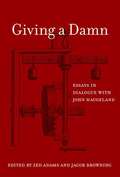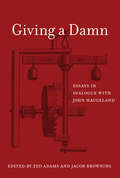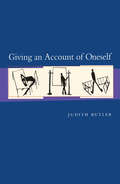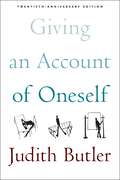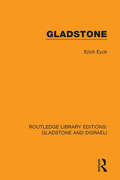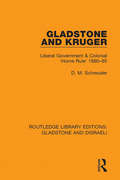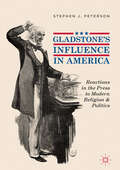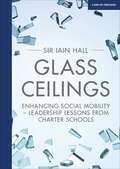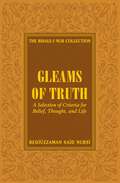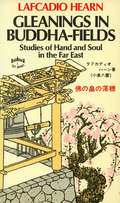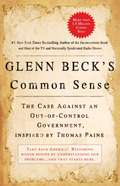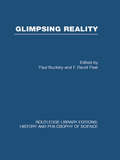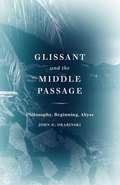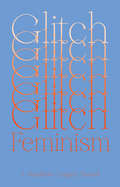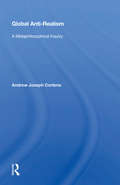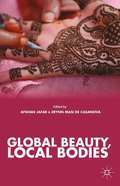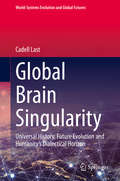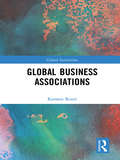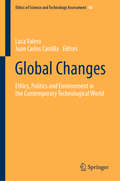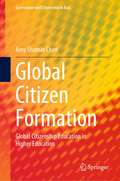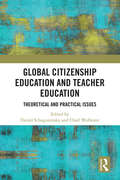- Table View
- List View
Giving a Damn: Essays in Dialogue with John Haugeland
by Jacob Browning Zed AdamsIn his work, the philosopher John Haugeland (1945--2010) proposed a radical expansion of philosophy's conceptual toolkit, calling for a wider range of resources for understanding the mind, the world, and how they relate. Haugeland argued that "giving a damn" is essential for having a mind -- suggesting that traditional approaches to cognitive science mistakenly overlook the relevance of caring to the understanding of mindedness. Haugeland's determination to expand philosophy's array of concepts led him to write on a wide variety of subjects that may seem unrelated -- from topics in cognitive science and philosophy of mind to examinations of such figures as Martin Heidegger and Thomas Kuhn. Haugeland's two books with the MIT Press, Artificial Intelligence and Mind Design, show the range of his interests.This book offers a collection of essays in conversation with Haugeland's work. The essays, by prominent scholars, extend Haugeland's work on a range of contemporary topics in philosophy of mind -- from questions about intentionality to issues concerning objectivity and truth to the work of Heidegger. Giving a Damn also includes a previously unpublished paper by Haugeland, "Two Dogmas of Rationalism," as well as critical responses to it. Finally, an appendix offers Haugeland's outline of Kant's "Transcendental Deduction of the Categories." ContributorsZed Adams, William Blattner, Jacob Browning, Steven Crowell, John Haugeland, Bennett W. Helm, Rebecca Kukla, John Kulvicki, Mark Lance, Danielle Macbeth, Chauncey Maher, John McDowell, Joseph Rouse
Giving a Damn: Essays in Dialogue with John Haugeland (The\mit Press Ser.)
by Jacob Browning Zed AdamsA collection of essays that use John Haugeland's work on intentionality, embodiment, objectivity, and caring to explore contemporary issues in philosophy of mind.In his work, the philosopher John Haugeland (1945–2010) proposed a radical expansion of philosophy's conceptual toolkit, calling for a wider range of resources for understanding the mind, the world, and how they relate. Haugeland argued that “giving a damn” is essential for having a mind—suggesting that traditional approaches to cognitive science mistakenly overlook the relevance of caring to the understanding of mindedness. Haugeland's determination to expand philosophy's array of concepts led him to write on a wide variety of subjects that may seem unrelated—from topics in cognitive science and philosophy of mind to examinations of such figures as Martin Heidegger and Thomas Kuhn. Haugeland's two books with the MIT Press, Artificial Intelligence and Mind Design, show the range of his interests.This book offers a collection of essays in conversation with Haugeland's work. The essays, by prominent scholars, extend Haugeland's work on a range of contemporary topics in philosophy of mind—from questions about intentionality to issues concerning objectivity and truth to the work of Heidegger. Giving a Damn also includes a previously unpublished paper by Haugeland, “Two Dogmas of Rationalism,” as well as critical responses to it. Finally, an appendix offers Haugeland's outline of Kant's "Transcendental Deduction of the Categories.” ContributorsZed Adams, William Blattner, Jacob Browning, Steven Crowell, John Haugeland, Bennett W. Helm, Rebecca Kukla, John Kulvicki, Mark Lance, Danielle Macbeth, Chauncey Maher, John McDowell, Joseph Rouse
Giving an Account of Oneself
by Judith ButlerWhat does it mean to lead a moral life?In her first extended study of moral philosophy, Judith Butler offers a provocative outline for a new ethical practice—one responsive to the need for critical autonomy and grounded in a new sense of the human subject.Butler takes as her starting point one’s ability to answer the questions “What have I done?” and “What ought I to do?” She shows that these question can be answered only by asking a prior question, “Who is this ‘I’ who is under an obligation to give an account of itself and to act in certain ways?” Because I find that I cannot give an account of myself without accounting for the social conditions under which I emerge, ethical reflection requires a turn to social theory.In three powerfully crafted and lucidly written chapters, Butler demonstrates how difficult it is to give an account of oneself, and how this lack of self-transparency and narratibility is crucial to an ethical understanding of the human. In brilliant dialogue with Adorno, Levinas, Foucault, and other thinkers, she eloquently argues the limits, possibilities, and dangers of contemporary ethical thought.Butler offers a critique of the moral self, arguing that the transparent, rational, and continuous ethical subject is an impossible construct that seeks to deny the specificity of what it is to be human. We can know ourselves only incompletely, and only in relation to a broader social world that has always preceded us and already shaped us in ways we cannot grasp. If inevitably we are partially opaque to ourselves, how can giving an account of ourselves define the ethical act? And doesn’t an ethical system that holds us impossibly accountable for full self-knowledge and self-consistency inflict a kind of psychic violence, leading to a culture of self-beratement and cruelty? How does the turn to social theory offer us a chance to understand the specifically social character of our own unknowingness about ourselves?In this invaluable book, by recasting ethics as a project in which being ethical means becoming critical of norms under which we are asked to act, but which we can never fully choose, Butler illuminates what it means for us as “fallible creatures” to create and share an ethics of vulnerability, humility, and ethical responsiveness.
Giving an Account of Oneself: Twentieth Anniversary Edition, with a new preface by the author
by Judith ButlerWhat does it mean to lead a moral life? In their first extended study of moral philosophy, Judith Butler offers a provocative outline for a new ethical practice—one responsive to the need for critical autonomy yet grounded in the opacity of the human subject. Butler takes as their starting point one’s ability to answer the questions “What have I done?” and “What ought I to do?” They show that these questions can be answered only by asking a prior question, “Who is this ‘I’ who is under an obligation to give an account of itself and to act in certain ways?” Because I find that I cannot give an account of myself without accounting for the social conditions under which I emerge, ethical reflection requires a turn to social theory. In three powerfully crafted and lucidly written chapters, Butler demonstrates how difficult it is to give an account of oneself, and how this lack of self-transparency and narratibility is crucial to an ethical understanding of the human. In dialogue with Adorno, Levinas, Foucault, and other thinkers, they eloquently argue the limits, possibilities, and dangers of contemporary ethical thought. Butler offers a critique of the moral self, arguing that the transparent, rational, and continuous ethical subject is an impossible construct that seeks to deny the specificity of what it is to be human. We can know ourselves only incompletely, and only in relation to a broader social world that has always preceded us and already shaped us in ways we cannot grasp. If inevitably we are partially opaque to ourselves, how can giving an account of ourselves define the ethical act? And doesn’t an ethical system that holds us impossibly accountable for full self-knowledge and self-consistency inflict a kind of psychic violence, leading to a culture of self-beratement and cruelty? How does the turn to social theory offer us a chance to understand the specifically social character of our own unknowingness about ourselves? By recasting ethics as a project in which being ethical means becoming critical of norms under which we are asked to act, but which we can never fully choose, Butler illuminates what it means for us as “fallible creatures” to create and share an ethics of vulnerability, humility, and ethical responsiveness.
Glad to the Brink of Fear: A Portrait of Ralph Waldo Emerson
by James MarcusAn engaging reassessment of the celebrated essayist and his relevance to contemporary readersMore than two centuries after his birth, Ralph Waldo Emerson remains one of the presiding spirits in American culture. Yet his reputation as the starry-eyed prophet of self-reliance has obscured a much more complicated figure who spent a lifetime wrestling with injustice, philosophy, art, desire, and suffering. James Marcus introduces readers to this Emerson, a writer of self-interrogating genius whose visionary flights are always grounded in Yankee shrewdness.This Emerson is a rebel. He is also a lover, a friend, a husband, and a father. Having declared his great topic to be &“the infinitude of the private man,&” he is nonetheless an intensely social being who develops Transcendentalism in the company of Henry David Thoreau, Margaret Fuller, Bronson Alcott, and Theodore Parker. And although he resists political activism early on—hoping instead for a revolution in consciousness—the burning issue of slavery ultimately transforms him from cloistered metaphysician to fiery abolitionist.Drawing on telling episodes from Emerson&’s life alongside landmark essays like &“Self-Reliance,&” &“Experience,&” and &“Circles,&” Glad to the Brink of Fear reveals how Emerson shares our preoccupations with fate and freedom, race and inequality, love and grief. It shows, too, how his desire to see the world afresh, rather than accepting the consensus view, is a lesson that never grows old.
Gladstone (Routledge Library Editions: Gladstone and Disraeli #1)
by Erich EyckOriginally published in 1966 and translated by Bernard Miall, Gladstone traces William Gladstone’s career from his election to Parliament in 1832, to his funeral in Westminster Abbey. The book portrays Gladstone as a firm adherent of Toryism and it describes his relations with Peel and Palmerston, as well as giving a well-founded account of his growing Liberalism and his rivalry with Disraeli. Eyck has written a generous and perceptive account of Gladstone’s life and career which since its first publication in 1938 has become generally recognized as a valuable contribution to the history of the nineteenth century.
Gladstone and Kruger: Liberal Government & Colonial 'Home Rule' 1880-85 (Routledge Library Editions: Gladstone and Disraeli #3)
by Deryck SchreuderOriginally published in 1969, Gladstone and Kruger examines British reactions to the Afrikaner nationalism. Beginning with the first Anglo-Boer war of 1880-81, it examines the formulation of policy after the British defeat at Majuba Hill. A that moment, the dangers of a pan-Afrikaner revolt in the Transvaal, Orange Free State and Cape Province seemed imminent, and the British presence in southern Africa seemed very much at risk. Schreuder shows how the devolution of metropolitan Imperial power on to local ministries conflicted with the Whig concern for the preservation of British dominance and prestige abroad and provides a commentary on the Liberal response to the Irish problem.
Gladstone's Influence in America: Reactions in the Press to Modern Religion and Politics
by Stephen J. PetersonBy the end of the nineteenth century, William Gladstone was arguably the most popular statesman in America since Lincoln. How did a British prime minister achieve such fame in an era of troubled Anglo-American relations? And what do press reactions to Gladstone’s policies and published writings reveal about American society? Tracing Gladstone’s growing fame in the United States, beginning with his first term as prime minister in 1868 until his death in 1898, this volume focuses on periodicals of the era to illuminate how Americans responded to modern influences in religion and politics. His forays into religious controversy highlight the extent to which faith influenced the American cult of Gladstone. Coverage of Gladstone’s involvement in issues such as church disestablishment, papal infallibility, Christian orthodoxy, atheism and agnosticism, faith and science, and liberal theology reveal deepening religious and cultural rifts in American society. Gladstone’s Influence in America offers the most comprehensive picture to date of the statesman’s reputation in the United States.
Glass Ceilings: Enhancing Social Mobility: Leadership Lessons From Charter Schools
by Iain HallAfter a Damascene moment following a school trip to the US, Sir Iain Hall realised the UK's approach to urban education is all wrong. In Glass Ceilings, the hugely experienced and respected educator lays out his vision to get social mobility moving again in the UK.
Glass Ceilings: Enhancing Social Mobility: Leadership Lessons From Charter Schools
by Iain HallAfter a Damascene moment following a school trip to the US, Sir Iain Hall realised the UK's approach to urban education is all wrong. In Glass Ceilings, the hugely experienced and respected educator lays out his vision to get social mobility moving again in the UK.
Glass Grapes: and Other Stories (American Readers Series)
by Martha RonkGlass Grapes and Other Stories is the first full-length collection of short stories by distinguished poet and fiction writer Martha Ronk. Ronk&’s work has garnered critical accolades and numerous awards, including, most recently, a 2005 PEN USA Award in poetry, a 2007 NEA Fellowship, and a 2007 National Poetry Series Award. Glass Grapes is a collection of short, experimental stories, usually dominated by an object imbued with fetishistic qualities by an obsessive, self-involved narrator. The language of these stories is repetitive, provocative, imagistic, occasionally comic, and unnerving. Ronk&’s fiction moves with the same grace, beauty, and attention to language as her most accomplished poetry.
Gleams Of Truth
by Ali UnalWritten in prose but with a verse-like flavor, this book is a collection of maxims by Bediuzzaman Said Nursi. Very concisely articulated, these maxims expound on the key discussions of the Risale-I Nur collection; thus it is considered in a sense an index to the collection, which was written years later than this book.
Gleanings in Buddha-Fields
by Lafcadio HearnLafcadio Hearn's books continue to charm and captivate readers, as the exotic subjects about which he wrote charmed and captivated him. Gleanings In Buddha-Fields presents more Hearn magic as he enters into the spirit of Buddhism asthough he were born into it. "I an individual," he writes, "an individualsoul! Nay, I am a population-a population unthinkable for multitude, even by groups of a thousand millions! Generations of generations, I am, aeons of aeons! Countless times the concourse now making me has been scattered, and mixed withother scatterings. Of what concern, then, the next disintegration?" (Shades of Walt Whitman!) Hearn says that if he were a god, dwelling in some old Izumo shrine on the summit of a hill, then "as air to the bird, as water to the fish, so would all substance be permeable to the essence of me. I should pass at will into the walls of my dwelling to swim in the long gold bath of a sunbeam, to thrill in the heart of a flower, to ride on the neck of a dragonfly." He writes of a trip to Kyoto, telling of hazy autumn rice fields, with dragonflies darting over the drooping grain; maples crimsoning above a tremendous gorge; ranges of peaks steeped in morning mist; and a peasant's cottage perched on the verge of some dizzy mountain road. Also, there are fine bits of realism, such as a cat seizing a mouse in the act of stealing the offerings placed in a Buddhist household shrine. In the chapter "Dust," Hearn tells of a children's playground, and says that children in all countries play at death. But the idea of ceasing to exist could not possibly enter a child's mind: the butterflies and birds, the flowers, the foliage, the sweet summer itself, only play at dying-they seem to go, but they all come back again after the snow is gone. "The real sorrow and fear of death arise in us only after the slow accumulation of experience with doubt and pain; and these little boys and girls being Japanese and Buddhists will never, in any event, feel about death just as you and I do . . . they have died millions of times already, and have forgotten the trouble of it, much as one forgets the pain of successive toothaches." In "Nirvana," Hearn writes that Buddhism, recognizing no permanency, no finite stabilities, no distinction of character or class or race, except as passing phenomena, is essentially the religion of tolerance. This thought-provoking reprint of an old favorite will delight people of all races and creeds.
Gleichheit, Politik und Polizei: Jacques Rancière und die Sozialwissenschaften
by Thomas Linpinsel Il-Tschung LimJacques Rancière gilt als einer der einflussreichsten französischen Philosophen der Gegenwart, in dessen gesamtem Werk immer wieder das Motiv der radikalen Kritik an der Sozialwissenschaft in Szene gesetzt wird. In dem Sammelband werden zahlreiche Denkmotive des französischen Philosophen aus einer genuin sozialwissenschaftlichen Perspektive aufgegriffen, weitergedacht und kritisiert, wobei in den einzelnen Artikeln konkrete Forschungsperspektiven mit Rancière entwickelt, methodologische Überlegungen im Anschluss an Rancière vorgestellt, gesellschaftstheoretische Reflexionen vor dem Hintergrund der Kritik des Philosophen unternommen sowie Aspekte seines politischen Denkens in die politische Theorie integriert werden. Aber auch sozialwissenschaftliche Kritik an der Philosophie Rancières findet in den Argumentationen der Autorinnen und Autoren ihren Platz. Somit bietet der Band ein breit gefächertes Spektrum an sozialwissenschaftlichen Anschlüssen an das Denken des französischen Philosophen. Einerseits schließt der Sammelband damit eine Lücke in der sozialwissenschaftlichen Forschung und ist anderseits der erste genuin sozialwissenschaftliche Beitrag in der umfangreichen jüngeren Forschung zum philosophischen Werk Rancières.
Glenn Beck's Common Sense
by Glenn Beck"If you believe it's time to put principles above parties, character above campaign promises, and Common Sense above all -- then I ask you to read this book...." In any era, great Americans inspire us to reach our full potential. They know with conviction what they believe within themselves. They understand that all actions have consequences. And they find commonsense solutions to the nation's problems. One such American, Thomas Paine, was an ordinary man who changed the course of history by penning Common Sense, the concise 1776 masterpiece in which, through extraordinarily straightforward and indisputable arguments, he encouraged his fellow citizens to take control of America's future -- and, ultimately, her freedom. Nearly two and a half centuries later, those very freedoms once again hang in the balance. And now, Glenn Beck revisits Paine's powerful treatise with one purpose: to galvanize Americans to see past government's easy solutions, two-part monopoly, and illogical methods and take back our great country.
Glimpsing Reality: Ideas in Physics and the Link to Biology (Routledge Library Editions: History & Philosophy of Science)
by Paul & Buckley & PeatOriginally published in 1979. This reprints the revised and expanded edition of 1996. In this volume, physicists, biologists and chemists, who have been involved in some of the most exciting discoveries in modern scientific thought explore issues which have shaped modern physics and which hint at what may form the next scientific revolution. The major issues discussed are the understanding of time and space, quantum and relativity theories and recent attempts to unite them and related questions in theoretical biology.
Glissant and the Middle Passage: Philosophy, Beginning, Abyss (Thinking Theory)
by John E. DrabinskiA reevaluation of Édouard Glissant that centers on the catastrophe of the Middle Passage and creates deep, original theories of trauma and Caribbeanness While philosophy has undertaken the work of accounting for Europe&’s traumatic history, the field has not shown the same attention to the catastrophe known as the Middle Passage. It is a history that requires its own ideas that emerge organically from the societies that experienced the Middle Passage and its consequences firsthand. Glissant and the Middle Passage offers a new, important approach to this neglected calamity by examining the thought of Édouard Glissant, particularly his development of Caribbeanness as a critical concept rooted in the experience of the slave trade and its aftermath in colonialism.In dialogue with key theorists of catastrophe and trauma—including Aimé Césaire, Frantz Fanon, George Lamming, Gilles Deleuze, Félix Guattari, Derek Walcott, as well as key figures in Holocaust studies—Glissant and the Middle Passage hones a sharp sense of the specifically Caribbean varieties of loss, developing them into a transformative philosophical idea. Using the Plantation as a critical concept, John E. Drabinski creolizes notions of rhizome and nomad, examining what kinds of aesthetics grow from these roots and offering reconsiderations of what constitutes intellectual work and cultural production.Glissant and the Middle Passage establishes Glissant&’s proper place as a key theorist of ruin, catastrophe, abyss, and memory. Identifying his insistence on memories and histories tied to place as the crucial geography at the heart of his work, this book imparts an innovative new response to the specific historical experiences of the Middle Passage.
Glitch Feminism: A Manifesto
by Legacy RussellA new manifesto for cyberfeminismThe divide between the digital and the real world no longer exists: we are connected all the time. How do we find out who we are within this digital era? Where do we create the space to explore our identity? How can we come together and create solidarity? The glitch is often dismissed as an error, a faulty overlaying, but, as Legacy Russell shows, liberation can be found within the fissures between gender, technology and the body that it creates. The glitch offers the opportunity for us to perform and transform ourselves in an infinite variety of identities. In Glitch Feminism, Russell makes a series of radical demands through memoir, art and critical theory, and the work of contemporary artists who have travelled through the glitch in their work. Timely and provocative, Glitch Feminism shows how the error can be a revolution.
Global Anti-realism: A Metaphilosophical Inquiry
by Andrew Joseph CortensThis book presents an idea on what a defense of realism must involve, discussing specific positions to help readers use it as a guide to identifying anti-realism in all its various guises. It offers a way of understanding anti-realism, both in its local versions and global versions.
Global Beauty, Local Bodies
by Erynn Masi de Casanova Afshan JafarWhat do the words global, transnational, national, and local mean when talking about beauty, which is simultaneously abstract and ephemeral, embodied and concrete? How do ideas and images of beauty circulate in a globalizing world, and how do people's bodily practices respond to them? Rather than simply examining how beauty is thought about and aspired to in international settings, this collection of original scholarly work and first-person accounts takes globalization processes and the transnational links these processes create as the jumping-off point for an examination of what it means to be, have, or aspire to a beautiful body.
Global Brain Singularity: Universal History, Future Evolution and Humanity’s Dialectical Horizon (World-Systems Evolution and Global Futures)
by Cadell LastThis book introduces readers to global brain singularity through a logical meditation on the temporal dynamics of the universal process. Global brain singularity is conceived of as a future metasystem of human civilization that represents a qualitatively higher coherence of order.To better understand the potential of this phenomenon, the book begins with an overview of universal history. The focus then shifts to the structure of human systems, and the notion that contemporary global civilization must mediate the emergence of a commons that will transform the future of politics, economics and psychosocial life in general. In this context the book presents our species as biocultural evolutionary agents attempting to create a novel and independent domain of technocultural evolution that affords us new levels of freedom.Lastly, the book underscores the internal depths of the present moment, structured by a division between subject and object. The nature of the interaction between subject and object would appear to govern the mechanics of a spiritual process that is key to understanding the meaning of singularity inclusive of observers. Given its scope, the book will appeal to readers interested in systems approaches to the emerging world society, especially historians, philosophers and social scientists.
Global Business Associations (Global Institutions)
by Karsten RonitGlobal business tends to be perceived as a number of individual but powerful multinational corporations, capable of controlling markets and influencing political decisions; in fact, global business is highly organized through a plethora of associations that bring together competing companies and conflicting national businesses. Indeed, global business associations have a long history and, with accelerated globalization, further opportunities emerge for unified business action. This book fills a significant gap in the current literature, examining the pivotal role of global business associations and providing a concise and accessible overview of their different functions in a range of institutional contexts. Beginning by clarifying the concept of global business associations, the author puts their role into a historical and contemporary context in which their economic, social and political functions are sketched. Their historical origin is outlined, including the proliferation of global associations in the twentieth and twenty-first centuries. He then moves on to explore and analyse the different types of actors, explaining key categories and their place in the organization of global business with chapters on peak associations (e.g. ICC and WEF), industry associations, alliances, as well as clubs and think tanks, and facilitators. Covering the history, current role and future evolution of this dynamic category of associations, this work will be essential reading for students and scholars of international political economy, international relations, international organizations and global governance.
Global Changes: Ethics, Politics and Environment in the Contemporary Technological World (Ethics of Science and Technology Assessment #46)
by Luca Valera Juan Carlos CastillaThis book offers an authoritative analysis of the challenges that have arisen as a result of modern technologies. It covers several environmental problems, such as climate change, overexploitation of natural resources, loss of natural habitats, pollution and human population growth, and discusses practical scenarios for sustainable human dwelling of our planet. Adopting an interdisciplinary approach, the first part introduces “global changes”, describing how they are happening in reality, and the challenges arising from them. The second part introduces methodological approaches borrowed from various disciplines, such as engineering, management science, philosophy and theology, which can help deal with the contemporary challenges resulting from global changes. Lastly, the third part discusses some of the themes presented in the light of novel concepts, such as the Anthropocene, and includes interesting proposals and ideas about how human beings could dwell the Earth in this new age. Offering a comprehensive theoretical reflection on the relation between technology, environment and human beings, it also provides a practice-oriented guide for researchers and decision-makers working on a new ethical paradigm of acting in the Anthropocene.
Global Citizen Formation: Global Citizenship Education in Higher Education (Governance and Citizenship in Asia)
by Amy Shumin ChenThis book explains the rationale of the changes and challenges of Taiwanese citizenship which emphasizes the various identities in the global and multicultural era. It explores the evolving relationship between the social movements, citizenship, the education of citizens and the young peoples’ viewpoints, asking how citizenship has been conceptualised in a dramatic transformation age. How has the curriculum and pedagogy designed to fit the global changes for cultivating young generations with rights and responsibilities to interpret in and adapt for the competence of citizenship? And what outcomes and attainments had the Taiwan’s undergraduates’ knowledge, attitudes and practices of competency on citizenship?
Global Citizenship Education in Teacher Education: Theoretical and Practical Issues (Critical Global Citizenship Education)
by Daniel Schugurensky Charl WolhuterGlobal Citizenship Education and Teacher Education brings together scholars and practitioners from all continents to explore the role of teacher education in formulating a practice of citizenship that has a global scope and is guided by critical and emancipatory approaches. By considering educational responses to global challenges —such as global warming, rising levels of inequalities, intensification of armed conflicts, growing streams of international migration, and the impact of neoliberal policies—this book provides valuable analyses for researchers, teacher educators, and educators. The volume examines historical and conceptual issues relating to the incorporation of global citizenship education in teacher education, and presents examples from across the world that showcase main trends in research and practice from across the world. This book is of great interest to graduate and postgraduate students, researchers, and libraries in the fields of citizenship education, global education, teacher education, international and comparative education, and education policy and politics.
